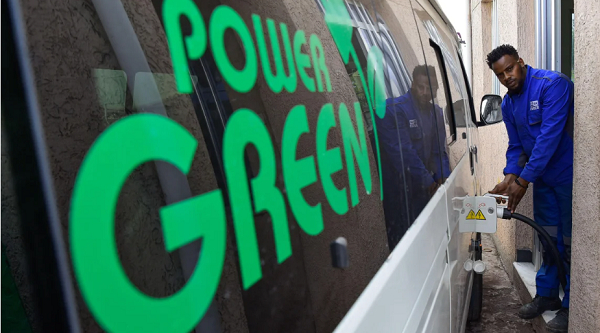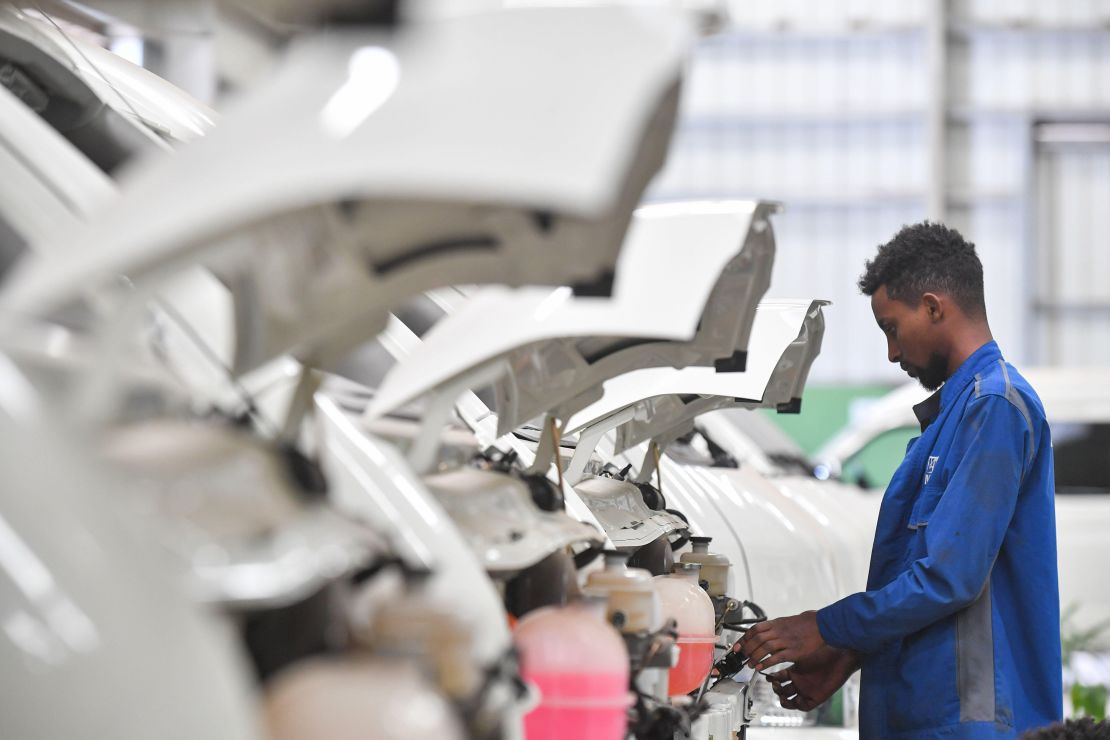
In Addis Ababa, Ethiopia’s capital, long lines at gas stations are becoming a common sight due to recent fuel shortages and soaring prices. Yet, electric vehicle (EV) drivers like Mikial Belayneh are bypassing these queues entirely.
Belayneh, an Addis Ababa resident, charges his imported Toyota bZ4X—a popular EV in the country—at home. He finds that a full charge lasts him for two days, eliminating the need for gas station stops. This shift to electric vehicles reflects a broader transition in Addis Ababa, a city rapidly evolving and central to Ethiopia’s ambitious plans to lift millions out of poverty.
The city’s roads are now seeing a mix of traditional, polluting vehicles alongside cleaner, quieter electric alternatives. Electric buses, small 15-seat minibuses, cars, and motorbikes are increasingly common on Addis Ababa’s streets. Currently, Ethiopia boasts around 100,000 EVs, and the government anticipates this number will surpass 400,000 by 2032. This surge is primarily due to the government’s groundbreaking decision earlier this year to ban the import of all gas-powered passenger vehicles, a world first.
In addition to the import ban, the Ethiopian government has significantly reduced customs taxes on imported EVs. Previously, the tax on gas vehicles was up to 200%, but the import tax on fully assembled EVs is now just 15%, according to the country’s finance ministry. This move is part of a broader effort to encourage EV adoption.
The reduction in taxes is also stimulating local EV manufacturing. The Belayneh Kindie Group, based in Ethiopia, assembles vehicles using parts imported from China. Manager Besufekad Shewaye noted that import tariffs on EV parts are now nearly zero, which has contributed to the growing demand for electric vehicles.
Ethiopia’s push toward EVs is driven in part by the high cost of fuel imports and the fact that 96% of the country’s electricity is generated from clean hydropower. “Ethiopia is effectively a clean-energy country,” said Jane Akumu, a program officer at the United Nations Environment Programme. “Why import oil when you have a local, renewable energy source available for your vehicles?”
The Ethiopian government recognized the potential of its renewable energy resources when it began promoting electric vehicles, according to Assefa Hadis Hagos, a transportation adviser for the Ethiopian Ministry of Transport and Logistics. The total ban on gas-powered car imports, enacted in January, surprised many in the region. “We did not anticipate such a strong government stance on this issue,” Akumu commented.
Ethiopia, under its one-party government, has shown it can rapidly implement environmental policies. In the early 2000s, the country swiftly banned inefficient and hazardous leaded gasoline. “Other countries might require a more gradual and consultative process,” Akumu noted, referencing her own efforts to eradicate leaded gasoline across Africa.
Car ownership in Ethiopia remains low, with around 1.2 million vehicles—roughly one car per 100 people. In contrast, the US has a car ownership rate exceeding 90%, and Nigeria, Africa’s most populous country, has about 11.8 million cars, or 5 to 6 per 100 people.
High taxes on gas-powered vehicles have kept car ownership low in Ethiopia, as the government aims to promote public transportation. Although EV import taxes have been reduced, electric cars remain costly. “Currently, EVs are mainly purchased by high-income individuals,” said Iman Abubaker, a sustainable transportation expert with the World Resources Institute. His group advocates for greater investment in electric buses and public transport to make EVs accessible to all income levels.
Despite the high costs, the number of EVs in Ethiopia is steadily increasing. Since the government set a goal in 2022 to introduce over 100,000 EVs within ten years, EVs now make up nearly 10% of the country’s vehicle fleet, according to CleanTechnica.
 The Ethiopian government is pleased with the progress and remains committed to reducing pollution from gas vehicles, For now, Ethiopia’s stance on banning gas car imports is unique. However, EV adoption is also growing in other African nations. In Nairobi, Kenya, the number of electric motorbikes surged by 500% in one year following government tax incentives. These bikes, which are becoming more common on Nairobi’s streets, have already begun reducing noise pollution.
The Ethiopian government is pleased with the progress and remains committed to reducing pollution from gas vehicles, For now, Ethiopia’s stance on banning gas car imports is unique. However, EV adoption is also growing in other African nations. In Nairobi, Kenya, the number of electric motorbikes surged by 500% in one year following government tax incentives. These bikes, which are becoming more common on Nairobi’s streets, have already begun reducing noise pollution.
In Addis Ababa, stricter measures, including prohibiting licenses for fuel-run motorbikes, are being implemented, and the city recently introduced its first fleet of electric buses.
While Ethiopia remains the only country with a complete ban on gas car imports, the trend towards EVs is evident across Africa. As with the mobile phone revolution, the transition to electric vehicles is expected to continue growing, albeit with a need for more infrastructure and government support to broaden adoption.






